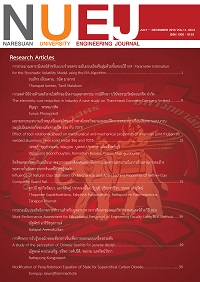Effect of tool rotational speed on metallurgy and mechanical properties of dissimilar joint friction stir welded aluminum semi solid metal 356 and 7075
Main Article Content
Abstract
Friction Stir Welding (FSW) is the new welding process applied in this research to join dissimilar grades of aluminum alloy sheets Semi-Solid Metal (SSM) 356 and 7075 with dimensions of 50 mm × 100 mm × 4 mm. The effect of tool rotational speed on metallurgy and mechanical properties of welding was investigated. Dissimilar butt joints were produced by using cylindrical pin with conditions of different tool rotation speed (710, 1,000 and 1,400 rpm) and welding speed (80, 112 and 160 mm/min). The welding microstructures showed 3 different areas including base metal, stir zone and thermo mechanical affected zone, which are directly affected by the rotation speed of tool pin. The butt joint rotation speeds 1,000 rpm provided the average maximum tensile strength 198.67 MPa. Rotation speed of tool pin served pushing the material flow from front to back of tool pin for generating the thermal from friction to change the grain leading to good mix and adhesion of both materials.
Article Details
How to Cite
Boonchouytan, W., burapa, romadorn, & Muangjunburee, P. (2016). Effect of tool rotational speed on metallurgy and mechanical properties of dissimilar joint friction stir welded aluminum semi solid metal 356 and 7075. Naresuan University Engineering Journal, 11(2), 21–30. https://doi.org/10.14456/nuej.2016.24
Section
Research Paper


